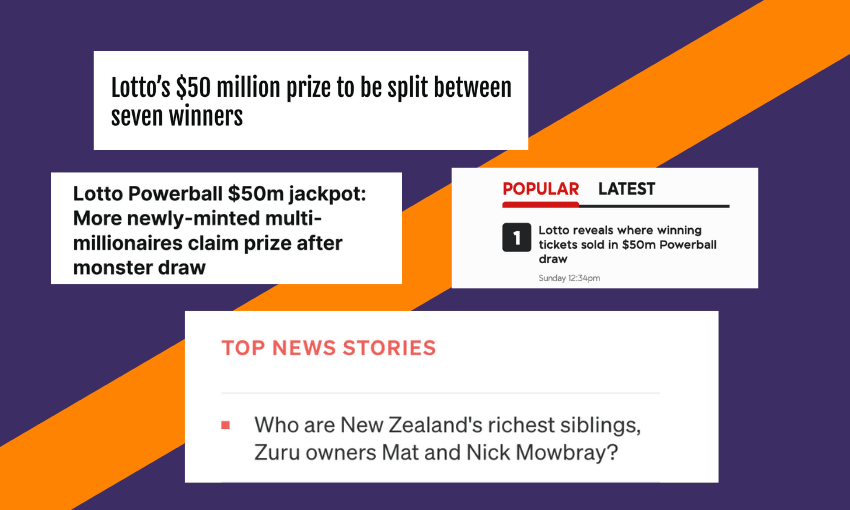Interest in Lotto and the Rich List has never been greater. Madeleine Chapman ponders why.
On Saturday the big story was the must-win $50m Lotto jackpot. Every major news outlet ran multiple stories ahead of the draw. Are self-selected numbers more likely to win than a random line? Is it better to buy in-store or on the app? (The answer to all questions was your chances of winning Lotto are equally minuscule no matter what you do.)
On Sunday the big story was that the must-win $50m Lotto jackpot was in fact won – by seven people, who would take home a cool $7m each. A record 1.7 million tickets were sold and there were virtual queues on Saturday night as every last one of the buyers scrambled to check if they were one of the lucky seven. Presumably some of those people also checked the homepages of Stuff, NZ Herald and RNZ to seethe jealously at the (inevitably) anonymous winners.
Overnight, seven people went from being like the rest of us to being millionaires. It could’ve been anyone (including me and you), but it happened to be them.
On Monday, $50m was a drop of piss in the ocean of NBR’s List, more commonly known as The Rich List. And the big news? There’s a new richest boy in town. For more than 20 years, Graeme Hart has been the richest New Zealander in history. Valued at $12bn, Hart went from working as a panelbeater and tow-truck driver as a teenager to being an investment magnate. But now the Mowbray brothers, Mat and Nick, have taken the crown of New Zealand’s richest people. Collectively valued at $20bn (one could argue Hart should therefore still have topped the list, but let’s be honest, there are no real losers in this story), the Mowbrays own Zuru, a company that manufactures terrifying amounts of plastic toys and nappies.
Three days of national news dominated by stories of people who either just got rich or have been rich for a very long time. And three days of those stories doing huge numbers across the country. People just love to read about other people getting rich. But especially when it feels like it’s getting harder and harder to make the most basic of ends meet. Reading about the lovely couple from Porirua last year who won Lotto and planned to do nothing different except “maybe have a nice dinner” genuinely made me well up. When we’re all in the capitalist machine, it’s nice to see others, even strangers, get out. Like the martians in Toy Story watching an unwitting friend be plucked out by the claw.
A huge part of it, in my opinion, is the heavy suggestion that “it could happen to you”. Seven winners last weekend had all their financial woes disappear after doing nothing but buying a ticket. And that could’ve been me. Five of them were from Auckland. That definitely could’ve been me! Hart had hard labour jobs before becoming a billionaire, as if he was a regular person once. That could be me too.
This framing of everyone being just one step away from all their problems being solved works best when everyone feels like their problems are the worst they’ve ever been. If all the Lotto winners turned out to have been millionaires already, we’d all feel a little bit worse about our loss. But we’d probably still click on the story.
Which is probably why multiple media reports regurgitated NBR’s descriptor of the Mowbrays’ business journey as “starting in a garage in Cambridge”. Which garage? Such language is shorthand for “started from nothing” and rarely actually means anything was done in a garage, but the Mowbrays have always had plenty. And the widely understood beginning to their story is not toiling away in a suburban garage but rather “set[ting] up a toy factory in Guangzhou, China, with financial help from their mum and dad”.
This couldn’t be me even if I tried, but that’s less interesting to read when I spent the weekend walking around the very expensive neighbourhood where my partner and I rent, discussing with much delight what we would do when we definitely won the $50m jackpot.
There’s an air of dystopia in the soaring interest in Lotto during times of economic struggle. As those earning the least looked at the much-touted tax cuts on budget day and saw they’d be maybe $8 better off a week, why not take a chance on Lotto? As we see the marginal drop in house prices in Auckland presented as a bad news story, why not spend $16 on the hope of financial freedom?
There was no official calculation done to determine that the Mowbrays had overtaken Hart in worth, but it sure made a strong news hook to have a new richest family after two decades. If they could do it, so could you.
An optimist would say that people buying Lotto tickets in a cost of living crisis is a show of hope, a willingness to take a punt on a better future. A realist would say it’s a collective show of desperation, a belief that the only way out is through sheer, slim luck. Whatever the case, it’s a win for Lotto and a win for those writing stories about rich people, new and old. See you next week.





